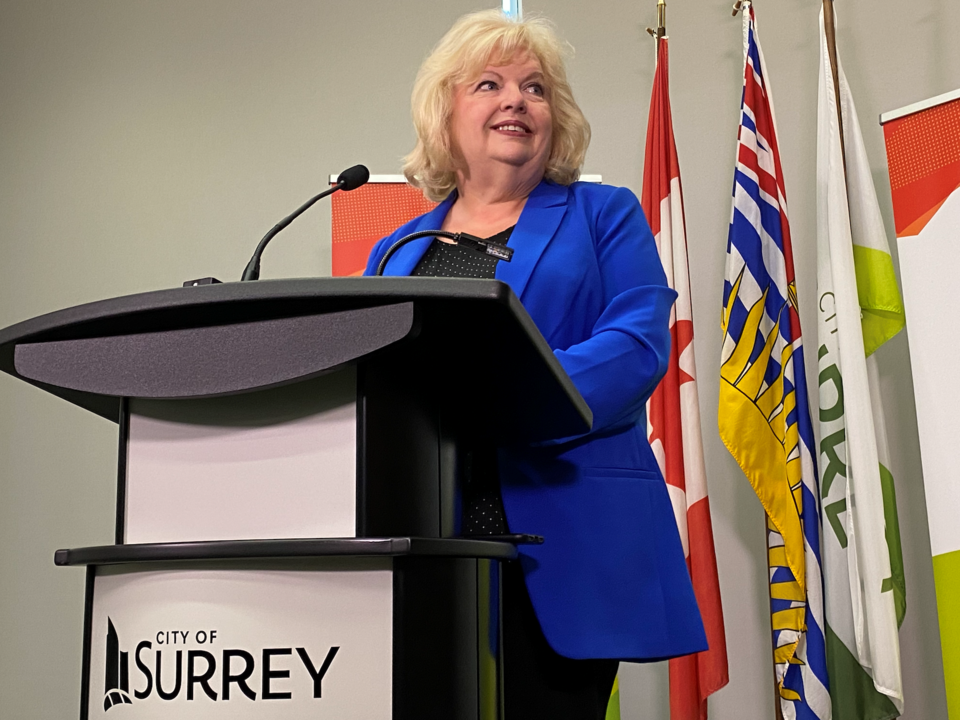Premier David Eby appears to have opened the door to more funding to solve the long-running policing dispute in Surrey. But the city will need to act fast if it wants to seize the cash.
The NDP government already has $150 million on the table to assist Surrey in transitioning away from the RCMP to a new municipal Surrey Police Service.
Mayor Brenda Locke has fought to stay with the RCMP, rejecting the provincial aid and instead filing a legal challenge against the government’s authority to impose the policing change onto her community.
Locke took to social media Tuesday to argue the additional cost to Surrey taxpayers for a municipal force will be $464 million over the next decade — figures the city included in its court case as well.
“My team and I were elected on a platform of ending the proposed police transition that was flawed from the start,” wrote Locke.
“We said it would cost millions more than estimated, and that recruitment efforts would fail. Both of those warnings have come true.”
Locke and Solicitor General Mike Farnworth have fought so intensely on the issue that neither speaks to each other anymore, except to issue threats through the media.
Eby attempted to take on the “good cop” route Tuesday, extending an olive branch to the mayor. When asked if he would consider increasing the $150 million provincial offer to Surrey, the premier said this:
“The mayor fought a good fight, she raised a lot of important issues, but now it's time for us to sit down and sort it out,” said Eby.
“And that's where the province is going, and it will be so much more efficient, so much cheaper for everybody, especially taxpayers… if we're able to do this quickly and efficiently.
“The province has committed to Surrey that we will support them. We understand there are additional costs here. We will support them in that and I'm happy to have those discussions.”
It’s clear Locke and the city will need to do three things, in short order, to squeeze more cash out of the premier.
Step one: Actually agree to talk.
The mayor has refused to speak with provincial officials for some time now, including rejecting a briefing on new legislation introduced this week that will enshrine into law Surrey’s obligation to proceed with a municipal force.
There’s currently zero dialogue between her and the premier at the moment. Eby has directly called her back to the table. She won’t be able to negotiate through the media.
“I think there is a moment here for us to regroup with the city, to reset,” said Eby.
Step two: Immediately abandon the city’s legal fight.
Any extra help from the province requires the city to quit the frivolous court challenges, like the one it has filed against the province in B.C. Supreme Court.
“It is very clear that the city will not be successful in any legal challenge,” said Eby.
“It is a waste of taxpayer dollars. The province is going in this direction. So let's sit down, move forward.”
Step three: Speed up the transition.
B.C. won’t be putting any more money on the table if all it gets in return is sulking, foot-dragging and stalling from Surrey city hall. That means no more delays, missed deadlines, refusals to meet the province’s policing transition advisor, unanswered phone-calls and studied indifference to letters sent by the government’s director of police services.
The best route to more funding is for the city to actually fast-track the transition that the province wants to see.
“One of the big challenges around the Surrey police transition is that the longer this process is dragged out, the more expensive it gets,” said Eby.
The steps aren’t unreasonable. But they will require the mayor and her majority on council to essentially concede defeat on the issue and move on to negotiating the terms of surrender. That’s still proving difficult.
“We will review the new legislation, but I am not going to simply accept a provincial decision that will that cost Surrey taxpayers millions of dollars, lead to significant tax increases, and deliver no public safety benefit,” Locke posted online Tuesday.
Eby, in extending his olive branch, attempted to concede publicly that not all of Locke’s concerns about tax increases and recruitment are without merit.
“I accept the important issues that the mayor has raised on this issue,” he said.
“I think it's important that she raised concerns about costs, about implementation, and we're going to be there to be a good partner to address those issues.
“But whether or not we're moving forward to a municipal force is no longer up for discussion. They're moving forward to a municipal force in Surrey. And for everybody's benefit, we need to just get on with that work.”
Could Surrey squeeze out the full $450 million from the province? Unlikely.
But the opening is there to sweeten the pot above $150 million, if the two sides can actually start talking.
Rob Shaw has spent more than 15 years covering B.C. politics, now reporting for CHEK News and writing for Glacier Media. He is the co-author of the national bestselling book A Matter of Confidence, host of the weekly podcast Political Capital, and a regular guest on CBC Radio. [email protected]



.jpg;w=120;h=80;mode=crop)
